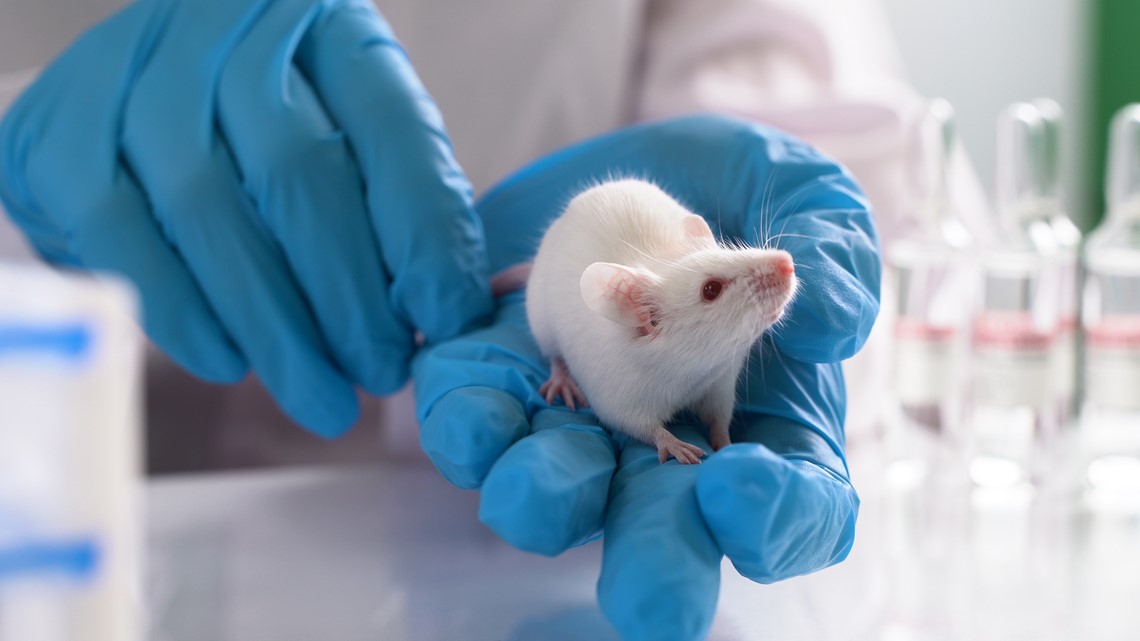INDIANAPOLIS — Mother of three Lauren Lynn remembers rushing to the emergency room during a horrific bout of nausea during her first pregnancy in 2014. She had been throwing up for weeks, even though she couldn’t bear to eat anything - not even water - while ten weeks pregnant.
Lynn’s husband and mother took turns driving her to work, so nauseous that she couldn’t be trusted behind the wheel. Even then, she had to be assisted down the hall by her coworkers and could only work a few hours as a paralegal.
The ER doctor who walked into her room that day told Lynn to eat some salty crackers, and she would be fine.
“That was the extent of the medical advice I was given. It was actually a nurse who pulled me aside and was like, please call an OB and get in. I think you have hyperemesis gravidarum,” Huffman said. "I don't need to give the gender of that doctor."
If not for that nurse who subtly keyed Lynn into the possibility that it was hyperemesis gravidarum, typically called HG, as a cause for her nausea, Lynn may have never heard of it. The severe, possibly life-threatening condition causes day-long nausea and vomiting bouts strong enough to trigger dehydration and weight loss. It affects an estimated 0.3–10.8% of pregnant people, according to the National Institutes of Health and increases the risk of pre-eclampsia and bloods clots, potentially endangering the life of the mother and fetus.
The condition causes a pregnancy to be classified “high risk”, according to the Cleveland Clinic and stats aside, Lynn says, it can make life unbearable for pregnant people.
“It’s more than morning sickness. It’s all-encompassing,” said Lynn, who suffered through HG throughout each of her three pregnancies.
Now, scientists have honed in on a hormone that could be responsible for causing morning sickness in the first trimester of pregnancy, an insight that could provide relief for people suffering from HG and millions more women enduring morning sickness.
Researchers at Cambridge University found levels of the GDF15 hormone in people’s bodies may play a factor in how they experience morning sickness during pregnancy, according to research published in the science journal Nature on Wednesday.
Nausea and vomiting are experienced by 70-80% of pregnant women in the first trimester of pregnancy, according to the Cleveland Clinic. A smaller percentage of people have prolonged symptoms that extend to delivery.
For women like Lynn who have enduring pregnancies with hyperemesis gravidarum, that scientists have pinpointed a possible cause to a debilitating sickness is life-changing.
"I love that women are speaking up about it because, you know, we're told it's so rare, and only 1 % of women get it," Lynn said. "I cried when I saw. Because I have two daughters, and it's been a discussion between my husband and dialogue. Because we know it's genetic that if our daughters ever had it, one of us would have to retire early so that we could help them," Lynn said.


Despite the disappointing interaction with the ER doctor, Lynn was able to get in contact with other doctors who not only believed what she was going through, but also knew how to treat it.
Lynn soon had daily visits from health aids, and was set up with device that hooked up to a port that sent liquids and medicine she couldn’t take orally into her stomach to prevent dehydration. She also found comfort through the experiences of other women with HG through an advocacy group, the HER Foundation.
They’re resources, community support and treatments that her own mother, who also suffered from HG, did not have access to while pregnant with her.
“There are some women who have it until the day they give birth. So, I consider myself lucky in that sense,” Lynn said.
Although hyperemesis gravidarum is rare, morning sickness itself is not. That means some people suffering from HG do not always get the treatment they need, or are not taken seriously Dr. Marlena Fejzo, a co-author of the new study, told the New York Times.
“I’ve been working on this for 20 years and yet there are still reports of women dying from this and women being mistreated,” Dr. Fejzo told the New York Times, whose extreme morning sickness was also disregarded during her pregnancy 15 years ago, was not treated, and eventually miscarried.
In 2018, a genome-wide analysis of more than 53,000 women found a link between the GDF15 gene and nausea and vomiting in pregnancy across a spectrum of severity, according to a report published in the National Library of Medicine. It had not been previously suspected for being behind pregnancy sickness, but researchers had evidence that the gene acted on a part of the brainstem that controls vomiting. It’s an overproduction that had been linked to chronic nausea and weight loss in people with cancer.
With that information in hand, researchers leveled their attention on GDF15. Genetic material gathered in this most recent study suggested to researchers that a person's risk of experiencing nausea and vomiting in pregnancy is greater if maternal levels of GDF15 before pregnancy are low, rather than high.
Crucially though, high levels of GDF15 being released by a fetus during pregnancy are associated with nausea and vomiting. But, the lower someone’s GDF515 levels were before pregnancy, the more likely they were to experience nausea and vomiting.
The authors hypothesized that seemingly inverse relationship was because the bodies of people with low levels of GDF515 prior to their pregnancies were reacting to the sudden rise of GDF15 being released by the fetus throughout their bodies. It is those people, scientists posit, who are more likely to experience HG or more intense stints of morning sickness.
Researchers then tested their hypothesis on mice, using suppression of appetite as their measuring stick because mice do not vomit. Mice that had been treated with a long-acting version of GDF515 were less likely to show a suppressed appetite when given a small dose of GDF515 than mice who had not been pre-exposed.
Mice that had been genetically engineered to lack GDF15 were then found to be more sensitive when introduced to the hormone than mice who expressed it normally.


“Overall, the results support a mechanism in which the sensitivity of some mothers to fetally derived GDF15, as a result of their relatively low previous exposure to this hormone, is responsible for nausea and vomiting during pregnancy,” the study said.
Scientists hope their findings may one day lead to a medication capable of blocking the effects of GDF515, or the creation of a mechanism that can introduce the hormone to women with low levels so their reaction is not as severe.
For Lynn, the study is validation to a serious condition and one she hopes the medical community continues to take seriously and fund studies more research for.
“I just want the women who have gone through it to know that you are seen. I believe you and the other women who have gone through this, I believe you. And I hope, moving forward, that you're taken seriously,” Lynn said.
Scientists are now delving into the role other genes could possibly play in morning sickness and HG, if other factors other than the GDF15 hormone contribute to nausea and vomiting during pregnancy, and why humans developed a physiological system that involves extreme vomiting when pregnant.

